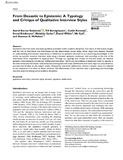| dc.contributor.author | Berner-Rodoreda, Astrid | |
| dc.contributor.author | Bärnighausen, Till | |
| dc.contributor.author | Kennedy, Caitlin | |
| dc.contributor.author | Brinkmann, Svend | |
| dc.contributor.author | Sarker, Malabika | |
| dc.contributor.author | Wikler, Daniel | |
| dc.contributor.author | Eyal, Nir | |
| dc.contributor.author | McMahon, Shannon A. | |
| dc.date.accessioned | 2022-03-13T05:50:48Z | |
| dc.date.available | 2022-03-13T05:50:48Z | |
| dc.date.copyright | 2018 | |
| dc.date.issued | 2018-11 | |
| dc.identifier.citation | Berner-Rodoreda, A., Bärnighausen, T., Kennedy, C., Brinkmann, S., Sarker, M., Wikler, D., . . . McMahon, S. A. (2020). From doxastic to epistemic: A typology and critique of qualitative interview styles. Qualitative Inquiry, 26(3-4), 291-305. doi:10.1177/1077800418810724 | en_US |
| dc.identifier.uri | http://hdl.handle.net/10361/16446 | |
| dc.description | This article was published in the Qualitative Inquiry [© The Author(s) 2018) ] and the definite version is available at: https://doi.org/10.1177/1077800418810724 The Journal's website is at: https://journals.sagepub.com/doi/10.1177/1077800418810724 | en_US |
| dc.description.abstract | Qualitative interview styles have been guided by precedent within academic disciplines. The nature of information sought,
and the role of interviewer and interviewee are key determinants across styles, which range from doxastic (focused
on understanding interviewees’ experiences or behaviors) to epistemic (focused on co-constructing knowledge). In this
article, we position common interview styles along a doxastic–epistemic continuum, and according to the role of the
interviewee (from respondent to equal partner). Through our typology and critique of interview styles, we enhance
epistemic interviewing by introducing “deliberative interviews,” which are more debate oriented and closer to equality in
the interviewee and interviewer relationship than existing interview styles. Deliberative interviews require a comprehensive,
pre-interview briefing on the subject matter followed by interactive deliberation wherein complex issues are debated
across viewpoints in an effort to devise solutions. The effectiveness of this interview style in generating new knowledge
warrants empirical testing across academic disciplines. | en_US |
| dc.language.iso | en_US | en_US |
| dc.publisher | SAGE Journals | en_US |
| dc.relation.uri | https://journals.sagepub.com/doi/10.1177/1077800418810724 | |
| dc.subject | Qualitative interviews | en_US |
| dc.subject | Interview styles | en_US |
| dc.subject | Doxastic | en_US |
| dc.subject | Epistemic | en_US |
| dc.subject | Deliberation | en_US |
| dc.title | From Doxastic to Epistemic: A Typology and Critique of Qualitative Interview Styles | en_US |
| dc.type | Journal Article | en_US |
| dc.description.version | Published | |
| dc.contributor.department | Brac James P. Grant School of Public Health | |
| dc.identifier.doi | https://doi.org/10.1177/1077800418810724 | |
| dc.relation.journal | The Qualitative Inquiry | |

